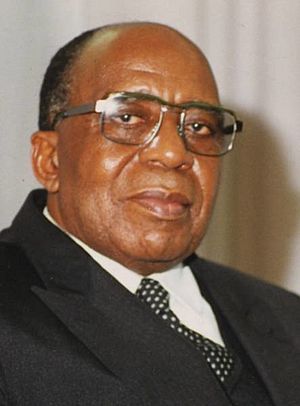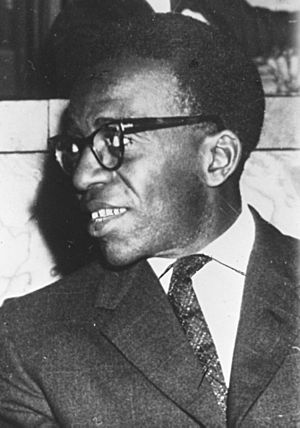Antoine Gizenga facts for kids
Quick facts for kids
Antoine Gizenga
|
|
|---|---|
 |
|
| 21st Prime Minister of the Democratic Republic of the Congo | |
| In office 30 December 2006 – 10 October 2008 |
|
| President | Joseph Kabila |
| Preceded by | Likulia Bolongo |
| Succeeded by | Adolphe Muzito |
| Deputy Prime Minister of Congo-Léopoldville | |
| In office 24 June 1960 – 14 September 1960 |
|
| Preceded by | Office established |
| Succeeded by | Jean Bolikango |
| Prime Minister of Congo-Stanleyville | |
| In office 12 December 1960 – 5 August 1961 |
|
| Preceded by | Office established |
| Succeeded by | Office abolished |
| Personal details | |
| Born | 5 October 1925 Mbanze, Belgian Congo (now Kwilu, Democratic Republic of the Congo) |
| Died | 24 February 2019 (aged 93) Kinshasa, Democratic Republic of the Congo |
| Political party | PALU PSA |
Antoine Gizenga (born 5 October 1925 – died 24 February 2019) was an important politician from the Democratic Republic of the Congo (DRC). He served as the Prime Minister of the Democratic Republic of the Congo from 2006 to 2008. He was also the leader of the Unified Lumumbist Party (PALU).
Early Life and Education
Antoine Gizenga was born on 5 October 1925. His birthplace was a small village called Mbanze. This village is in what is now Kwilu Province in the Democratic Republic of the Congo. Back then, it was known as the Belgian Congo.
He went to a Catholic primary school. For his high school education, he attended the Kinzambi and Mayidi seminaries. In 1947, he became a Catholic priest. He led a church in his home province of Kwilu. Later, he left this role for personal reasons. He then worked in different office jobs, including accounting. He also worked briefly in law enforcement for the colonial government. After that, Gizenga became a teacher at a Catholic high school. He married Anne Mbuba, and they had four children together.
Starting His Political Journey
Antoine Gizenga was inspired by the ideas of Patrice Lumumba. Lumumba was a leader who wanted his country to be independent. He also believed in Pan-Africanism, which means African countries working together. Gizenga helped create the Parti Solidaire Africain (PSA). This party had left-leaning ideas. Gizenga later became the leader of the PSA.
After Congo became independent in 1960, elections were held. Gizenga became Lumumba's deputy prime minister. This was for the new Republic of the Congo.
In September 1960, President Joseph Kasa-Vubu removed Lumumba and Gizenga from their jobs. This happened because Lumumba had involved the Soviet Union in the Congo Crisis. Lumumba protested this decision. The government then faced a difficult situation. Soon after, Colonel Joseph Mobutu took control in a coup. This made both Lumumba and the President lose their power. Mobutu later worked with President Kasa-Vubu.
Gizenga disagreed with Mobutu's new government. On 13 November, he went to Stanleyville to start his own government. On 12 December, he announced his government, called the Free Republic of the Congo. He said it was the true government of Congo. Lumumba tried to join him but was arrested. Lumumba was later executed in January 1961. Gizenga's government lasted for about six months. It was recognized by countries like the Soviet Union, China, and Egypt. However, it did not receive much practical help.
In August, Gizenga agreed to rejoin the main Congolese government. He became deputy prime minister again, this time under Cyrille Adoula. After his return ceremony, he chose to stay in Stanleyville. He did not go back to Léopoldville. Gizenga soon realized that Adoula was influenced by Western governments. Adoula was also willing to talk with rebel leader Moise Tshombe. Gizenga spoke out against Adoula. He said the government was acting against the country's interests.
In January 1962, the Congolese Assembly asked Gizenga to return to Léopoldville. They wanted him to answer questions about leading a rebel government. He said he would only come back when the conflict in Katanga was over. Gizenga then tried to arrest a military commander and a UN official. These officials were in Stanleyville to investigate an event. But Gizenga's soldiers did not follow his orders. Fights broke out between his supporters and Congolese soldiers. Several people died.
The United Nations Secretary General U Thant sent peacekeeping troops to restore order. Adoula then had Gizenga placed under house arrest. UN and Congolese troops guarded him. He was flown back to Léopoldville by a UN plane. He was then held at Camp Kokolo.
Gizenga turned down an offer of UN protection. He was later imprisoned on Bula Mbemba island, near the Congo River. In July 1964, Tshombe became prime minister. As part of trying to bring peace, he ordered Gizenga's release. But Gizenga quickly formed a new party. He spoke out against Tshombe's handling of the Simba rebellion. Because of this, Gizenga was placed under house arrest again in September.
Mobutu took power in a coup in November 1965. This action freed Gizenga. He fled to Congo-Brazzaville. He then moved to Moscow to study political science.
Over the next few years, Gizenga traveled to several countries. These included Egypt, Guinea, Mali, and Ghana. He was looking for support for the groups that opposed Mobutu. In 1973, he briefly joined Laurent-Désiré Kabila's rebel group. This group was in eastern Zaire (the new name for Congo). By joining them, Gizenga lost support from the Soviet Union. He then moved to France, but was sent to Algeria. After living briefly in Angola, he returned to the Republic of the Congo. Finally, he settled in Canada. Mobutu invited him to return to Zaire in 1977. Mobutu wanted Gizenga to be a leader for opposition groups. But Gizenga said no.
Later Political Career
In 1990, Mobutu began allowing more democracy in Zaire. This allowed Gizenga to return to the country. By 1993, he had brought together different groups into the Parti Lumumbiste Unifié (PALU). This party did not have many members. However, Gizenga was respected for his long history of opposing Mobutu.
He supported Laurent-Désiré Kabila when he took power in 1997. This led to the country's name being changed back to the Democratic Republic of the Congo. The next year, police searched Gizenga's house. Several PALU supporters were shot. After this, Gizenga opposed Kabila's leadership.
Gizenga ran for president as the PALU candidate in the July 2006 election. He came in third place with 13.06 percent of the votes. The other top candidates were Joseph Kabila (Laurent-Désiré's son) and Jean-Pierre Bemba.
On 30 September 2006, Gizenga signed an agreement with Kabila's group. This group was called the AMP. Gizenga agreed to support Kabila in the second round of the election. In return, he would become prime minister. Kabila won the election and became President on 6 December 2006.
Kabila then appointed Gizenga as Prime Minister on 30 December 2006. Gizenga's new government had 59 members. It was announced on 5 February 2007. A new, smaller government under Gizenga was announced on 25 November 2007. It had 44 ministers.
Gizenga passed on his duties as Secretary-General of PALU to Remy Mayele on 14 September 2007.
On 25 September 2008, Gizenga resigned as Prime Minister. He told Kabila about his decision. Later that day, he announced it on television. He said he was resigning because of his old age. Gizenga felt he could not continue in the job. He said, "For every man, even if you are sane and alert, your body has limits which you have to recognise."
The opposition party, the Movement for the Liberation of Congo (MLC), reacted to the news. They said Gizenga's resignation showed that his government had failed. They also disagreed that his age was the only reason for resigning. Kabila officially accepted Gizenga's resignation on 28 September. The ruling group stayed together. They then discussed who would replace Gizenga.
His replacement, Adolphe Muzito, was appointed by Kabila on 10 October 2008. Muzito was also a member of PALU. He had been the Minister of the Budget in Gizenga's government. Gizenga quickly returned to his role as Secretary-General of PALU on 13 October 2008. This was 13 months after he had given the role to Remy Mayele.
On 30 June 2009, Kabila named Gizenga a National Hero. This is the highest honor in the Democratic Republic of the Congo. He became the only living member of the Order of the National Heroes Kabila-Lumumba. This honor meant he would receive a monthly payment. It was equal to a prime minister's salary. He also received a home, a garage with six vehicles, and a guard of 12 national police members.
Antoine Gizenga passed away on 24 February 2019, at the age of 93. He died at the Centre Médical de Kinshasa.
See also
 In Spanish: Antoine Gizenga para niños
In Spanish: Antoine Gizenga para niños
- Prime Minister of the Democratic Republic of the Congo
- List of prime ministers of the Democratic Republic of the Congo
- Government of the Democratic Republic of the Congo
- Politics of the Democratic Republic of the Congo
- Antoine Gizenga cabinet
 | Madam C. J. Walker |
 | Janet Emerson Bashen |
 | Annie Turnbo Malone |
 | Maggie L. Walker |


